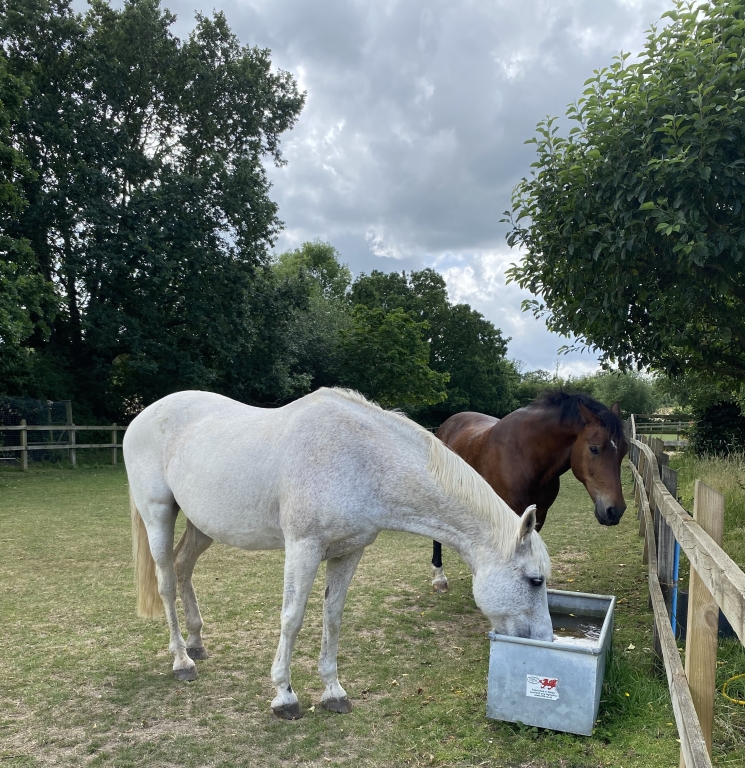
Nutrition Experts Share Advice On How To Help Your Horse Beat The Heat
Nutrition experts share advice on how to help your horse beat the heat
With another sizzling summer on the cards, the nutrition advisors for the SPILLERS™ brand are sharing their guidance on keeping equine digestive systems healthy in hot weather, with appropriate hydration and forage intake.
“The average 500kg horse on an all-hay diet may drink 40 litres of water per day and a horse exercising in hot weather, can lose as much as 10-15 litres of fluid per hour through sweating,” said Sarah Nelson, Product Manager at Mars Horsecare, home of the SPILLERS™ brand. “Dehydration can impair performance, poses several health risks and in severe cases it can be fatal. Hot, dry weather may also heighten the water soluble carbohydrate content in grass and increase the risk of laminitis, while sparse pastures may increase the risk of sand colic.”
Follow Sarah Nelson’s 11 practical tips to help your horse beat the heat safely this summer.
Keep water supplies fresh, clean and plentiful
Fresh grass contains around 80% water. Under normal circumstances it may go a long way in meeting requirements but when soaring temperatures have scorched the grass, intake from buckets and troughs could more than double so make sure clean fresh water is always available. Check automatic troughs are working and keep an eye on herd dynamics – older or less dominant horses may be prevented from accessing water.
Monitor fluid intake
If you are concerned about fluid intake, try using manually filled buckets and troughs in hot weather so that you can monitor drinking easily.
Tempt reluctant drinkers
Horses may be reluctant to drink when they are away. They may prefer to drink familiar water from home so where possible try taking water with you to shows. It may also help to train your horse to drink flavoured water, perhaps by adding apple juice or molasses but if you are competing always consider the risk of prohibited substances before choosing a flavour. If offering flavoured water always offer plain water as an alternative.
Count droppings to assess forage intake
Although your field may look bare, if your horse or pony is overweight and you are picking up a similar number of droppings feeding additional forage may not be necessary. Yellow grass may not look particularly appetising but if there is enough available it will have a similar energy level to hay which is more than enough to sustain many horses.
Support hydration by using a soaked feed
Using soaked feeds is a great way of getting extra fluid on board via the feed but an added benefit is that horses fed mashes may drink more too. Soaked feeds may be especially useful for those who are fussy drinkers.
Don’t prepare soaked feeds in advance
Soaking feeds in advance in hot weather can cause them to ferment quickly which is not desirable. Instead choose a fast-soaking mash – some take less than 5 minutes to prepare.
Avoid soaking hay for more than 3 hours
Soaking causes a rise in microbial contamination that may be exacerbated in hot weather. If soaking to reduce the ‘sugar’ content, we recommend 1-3 hours in warm weather and 6-12 hours in cold weather. If soaking to reduce ‘dust’ just 10 minutes may be sufficient.
Beware scorched grass may be high in WSC
Whilst drought and overgrazing inhibit growth, grass continues to produce sugar in sunny conditions. When it can’t be used for growth, this sugar is stored in the stem as fructan which means scorched grass may still be high in water soluble carbohydrates (WSC: includes simple sugars and fructan), presenting a hidden danger for laminitics.
Avoid sand colic
The risk of colic from eating sand or soil is much higher if grass coverage is very sparse. Consider feeding hay or a low calorie hay replacer, ideally in a net, feeder or bucket rather than from the ground.
Provide a salt lick
The recommend amount of compound feed or balancer, suitable forage and access to an equine salt lick will generally meet electrolyte requirements for maintenance. For those sweating on a regular basis, table salt (the salt you put on your chips!) is often an effective way of providing additional sodium and chloride.
Take care when the rain arrives!
When the rain inevitably arrives there will be a rapid increase in grass growth and consequently intake, increasing the risk of laminitis, weight gain and colic. Access to grazing may need to be restricted for good doers or removed completely for those at very high risk of laminitis.
SPILLERS™ Perform & Restore Mash
Feeding SPILLERS™ Perform & Restore Mash supports hydration and helps to replace some of the electrolytes lost through sweating. It is high in fibre and low in starch and sugar to support digestive health and reduce the risk of excitability.
For more advice on feeding your horse in hot weather contact the SPILLERS™ Care-Line on + 44 (0)1908 226626 or visit www.spillers-feeds.com.
More from Spillers

 3 years ago
3 years ago  1089 views
1089 views
